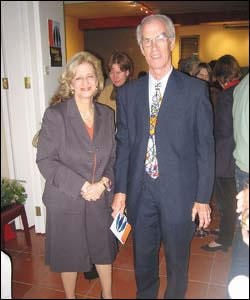Group work book fills gap
24 October 2005
Editor Lily Becker, left, with Prof Brian Robertson at the book launch.
Group work has a major contribution to make in advancing the development of any society, and particularly in a transforming country such as South Africa today.
This was the view of Emeritus Professor Brian Robertson of the Department of Psychiatry and Mental Health in the health sciences faculty in his presentation at the launch of the book Working with Groups, at the Centre for African Studies Gallery recently.
Robertson congratulated editor Lily Becker on the production of a "seminal" publication that not only showcases the work of academic and professional experts in a range of fields, but also clearly fulfills its intentions of providing students and practitioners with "ready access to the insights of current leading South African exponents of group work". The book fills a gap in South African contemporary social-work literature, and provides a theoretical overview as well as insights into the practice of group work in South Africa.
In his foreword Dr Malcolm Pines wrote: "Working with Groups should be widely read, not only in South Africa, but in all developing and developed countries. Through it we can see what has to be done and how it should be done."
Robertson said the book was unique in that it captured "an important selection of current group work responses to the needs of a repressed society in transition". In addition, it presented "group work initiatives in a variety of areas fundamental to a multicultural country grappling with poverty and past conflict". These included women's issues, adolescent acting out, HIV/AIDS, mental health consumer advocacy, and peace-building in the community.
Professor Joe Muller, director of the Graduate School in Humanities and deputy dean of research and postgraduate affairs, emphasised the value of research as explicated in the book and congratulated its contributors.
Interviewed before the launch, Becker said she hoped the book would convey the message that group work in different contexts could make a valuable contribution to a transforming society, particularly in the context of South Africa 11 years into democracy.
She said an important facet of group work practice was that it was able to "interface between individuals, families, communities and the broader society".
"Working with groups has helped to provide a deeper understanding of collective and individual intersecting dimensions such as cultural issues, trauma and community conflicts, as well as being a tool for transformational work.
"In groups we learn how to be democratic, how to be social beings, and how to allow other voices and differences to be heard."
A senior lecturer in the Department of Social Development, Becker is also principal lecturer in group work and in clinical practice in social work as well as coordinator of the postgraduate programmes in clinical practice. The result of years of work, the launch of this book fulfilled an important goal for Becker.
Its aim was to "promote group work as a valuable commodity in pursuing therapeutic and community goals" and "to demonstrate how the values embedded in key issues of groups, group work practice, and leadership could contribute to the development of a just, democratic and cohesive society".
"At another level, knowledge about groups and group behaviour can also illuminate aspects of large group and societal functioning, and, if heeded, can be valuable cues to thinking about change and stability," Becker said.
Group work is an effective, empowering and economical intervention in the South African context where there tended to be a lack of professional staff to cater to the needs of the population.
Becker said the book was the first of its kind in that it dealt with group work practice in different areas of need and in different contexts, and provided professional input in all the areas covered. Critical issues of group leadership, including ethical and human rights considerations in group work practice, were also addressed.
Each chapter is contributed by a specialist in their field. These include peace-making and conflict resolution, substance dependence, transformation and change, adolescence, single mothering, health professionals at primary-care level, groups and organisational life, as well as group analysis.
Besides Becker, contributors include Willem de Jager, Madeleine Duncan, Dr Monica Spiro, Professor Sandra Drower, Dr Assie Gildenhuys, Nelleke Keet, Pat Mayers, Dr Connie O'Brien, Peter Powis, Associate Professor Andre Smit, Shona Sturgeon and Ben Truter. They represent UCT as well as the universities of Pretoria and the Witwatersrand and a variety of specialist organisations.
Working with Groups is published by Oxford University Press and is aimed at undergraduate and graduate students of psychology, social work, occupational therapy and nursing as well as a wide range of practitioners.
 This work is licensed under a Creative Commons Attribution-NoDerivatives 4.0 International License.
This work is licensed under a Creative Commons Attribution-NoDerivatives 4.0 International License.
Please view the republishing articles page for more information.










